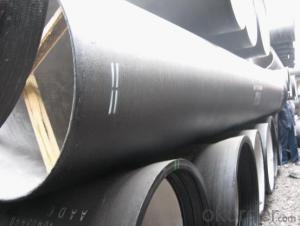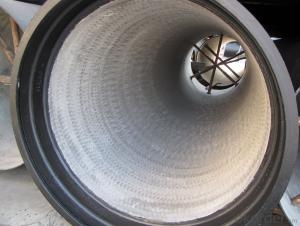Ductile Iron Pipe DN2000 K9/K8
OKorder Service Pledge
Quality Product, Order Online Tracking, Timely Delivery
OKorder Financial Service
Credit Rating, Credit Services, Credit Purchasing
You Might Also Like
Specifications
Quick Details
| Place of Origin: | China (Mainland) | Brand Name: | CMAX | Model Number: | T type / K type / Flange type |
| Length: | 6m / 5.7m / Negotiable | Standard: | ISO2531 / EN545 / EN598 | Application: | Potable / Sewage water |
| Diameter: | DN80~DN2200 | Shape: | Round | Hardness: | 230 |
| Pipe Wall Thickness: | standard | Pull Strength: | 420 | Yield (≥ MPa): | 300 |
| Material: | Ductile Iron | Type: | Centrifugal ductile cast iron pipe | Certification: | ISO2531 / EN545 / EN598 |
| Outer Diameter: | 80-2200 | Thickness: | standard | Specification: | DN80~DN2200 |
| |
The advantages to the customer:
Trustworthy financial strength.
One-stop shopping.
Fast and efficient service.
Coordination of shipments from multiple plants.
Specialists of the overseas shipping process.
A more competitive price.
- Q:Can ductile iron pipes be used for underground hydrocarbon pipelines?
- Indeed, underground hydrocarbon pipelines can utilize ductile iron pipes. Ductile iron, a robust and long-lasting substance, finds extensive usage in multiple domains, such as water and sewage systems, gas pipelines, and even hydrocarbon pipelines. Ductile iron pipes boast outstanding corrosion resistance qualities and can endure substantial pressure, rendering them apt for subterranean hydrocarbon transportation. Nonetheless, prudent material selection and the implementation of corrosion protection measures become essential, considering factors like the precise composition of the hydrocarbons being conveyed and the environmental conditions along the pipeline route.
- Q:Are ductile iron pipes resistant to alkaline attacks?
- Yes, ductile iron pipes are generally resistant to alkaline attacks. Ductile iron is known for its durability and corrosion resistance, making it suitable for various applications including water and wastewater systems. Alkaline substances, such as high pH levels in water or chemicals, can potentially cause corrosion in certain metals, but ductile iron has been specifically designed to withstand these conditions. Its composition, including the addition of alloying elements like nickel and chromium, enhances its resistance to alkaline attacks. Additionally, ductile iron pipes are often lined with protective coatings, such as cement mortar or polyethylene, further enhancing their resistance to alkaline substances. However, it is important to note that the specific resistance of ductile iron pipes to alkaline attacks can depend on factors such as the concentration and duration of exposure to alkaline substances, as well as the presence of other corrosive agents. Therefore, it is always advisable to consult with manufacturers or industry experts to ensure the suitability of ductile iron pipes for specific alkaline environments.
- Q:Which is better, ductile iron pipe and spray plastic pipe?
- Ductile cast iron: the use of more than 18 by adding nodulizer, after centrifugal ductile cast iron machine high speed centrifugal cast pipe, called "ductile" (Ductile Cast Iron Pipes), referred to as ball pipe, ductile iron pipe and ductile iron pipe etc.. The utility model is mainly used for conveying water, and is an ideal choice for tap water pipes.
- Q:How does ductile iron pipe perform in areas with high soil compaction?
- Areas with high soil compaction benefit greatly from the exceptional performance of ductile iron pipe. One of its key advantages lies in its high strength and durability, enabling it to withstand heavy loads and pressures. In regions where soil compaction is prevalent, leading to ground movement and settling, ductile iron pipe's superior structural integrity guarantees its intactness and effective handling of stress. Moreover, ductile iron pipe exhibits excellent resistance to corrosion, which is especially crucial in areas with high soil compaction. The compacted soil often contains elevated levels of moisture or chemicals that may accelerate the corrosion process. Ductile iron's inherent resistance to corrosion ensures the pipe maintains its integrity over time, even in challenging soil conditions. Flexibility is another advantage of ductile iron pipe. This material possesses a high degree of flexibility, enabling it to absorb and distribute external loads more efficiently. In areas with high soil compaction, where the ground may shift or settle, ductile iron's flexibility minimizes the risk of pipe failure or damage. Additionally, ductile iron pipe boasts a smooth interior surface, enhancing its hydraulic performance. In regions with high soil compaction, where space for proper compaction around the pipe may be limited, the smooth interior reduces the likelihood of sediment buildup or clogging, ensuring efficient water flow. Overall, ductile iron pipe proves to be an excellent solution for areas with high soil compaction. Its strength, corrosion resistance, flexibility, and hydraulic performance establish it as a reliable and durable choice capable of withstanding the challenges presented by compacted soils.
- Q:What is the acceptance of cast iron pipe material?
- According to the casting method, it is divided into continuous cast iron pipe and centrifugal cast iron pipe, in which the centrifugal cast iron pipe is divided into sand mould and metal type two kinds. Divided into gray cast iron pipe and nodular cast iron pipe according to different material.
- Q:Can ductile iron pipe be used for municipal water supply?
- Yes, ductile iron pipe can be used for municipal water supply. Ductile iron pipe has excellent strength and durability, making it suitable for carrying the high-pressure water supply required for municipal systems. Additionally, its corrosion resistance and long lifespan make it a reliable choice for transporting water in urban areas.
- Q:Can ductile iron pipes be used in high-pressure applications?
- High-pressure applications can indeed utilize ductile iron pipes. These pipes boast impressive strength and durability, which renders them suitable for managing high-pressure fluids or gases. When compared to alternative pipe types like PVC or HDPE, ductile iron pipes possess a higher pressure rating. Moreover, they exhibit excellent resistance to external loads and have the capacity to endure high internal pressures. Water and wastewater systems frequently employ these pipes, alongside industrial settings that encounter high-pressure conditions. Nevertheless, it is crucial to guarantee that ductile iron pipes utilized in high-pressure scenarios adhere to the necessary standards and specifications to assure safe and dependable operation.
- Q:What is the expected deflection capability of ductile iron pipes?
- Compared to other pipe materials, ductile iron pipes typically have a high expected deflection capability. These pipes possess a flexible nature that enables them to withstand external loads and stresses without breaking or cracking. This flexibility allows the pipes to deflect under pressure, absorbing and evenly distributing the force along their length. Factors such as pipe diameter, wall thickness, and soil conditions can influence the specific deflection capability of ductile iron pipes. However, in general, these pipes can typically deflect up to 2% to 5% of their diameter without causing significant damage or compromising structural integrity. This deflection capability allows the pipes to adapt to ground movement, thermal expansion, and other external forces, making them highly resilient and reliable for various applications. It is important to consider the deflection capability of ductile iron pipes in conjunction with other design criteria, such as pipe burial depth, trench width, and backfill material. By following proper installation practices and adhering to industry standards and specifications, the expected deflection capability of ductile iron pipes can be optimized and maintained throughout their service life.
- Q:What is the minimum pipe diameter of cast iron pipe?
- Nominal diameter of continuous grey cast iron pipe is 75~1200 mm, minimum 75 mm, maximum 1200 mm.
- Q:What are the advantages of using ductile iron pipe?
- Using ductile iron pipe in various applications offers several benefits. Firstly, ductile iron pipe is renowned for its strength and durability. It possesses higher tensile and yield strengths compared to other pipe materials, making it highly resistant to cracking, bending, and breaking. This exceptional strength enables the pipe to withstand high-pressure and heavy-load conditions, making it an ideal choice for applications such as water and sewage systems, oil and gas pipelines, and industrial piping. Secondly, ductile iron pipe exhibits excellent corrosion resistance. It is coated with a protective layer, typically zinc or epoxy, which prevents rusting and corrosion. This coating ensures a longer lifespan for the pipe, even in harsh environments or when transporting corrosive fluids. Another advantage of ductile iron pipe lies in its flexibility. Unlike rigid pipes, ductile iron pipes possess a certain level of flexibility, enabling them to endure ground movements and settle without fracturing. This flexibility proves particularly advantageous in areas prone to earthquakes or soil settlements. Additionally, ductile iron pipe boasts a smooth inner surface, minimizing flow resistance and enhancing fluid transportation efficiency. It also reduces the likelihood of sediment accumulation or corrosion within the pipe, resulting in improved flow rates and decreased maintenance requirements. Furthermore, ductile iron pipe proves cost-effective in the long run. Although it may entail higher initial costs compared to other pipe materials, its durability and minimal maintenance needs make it a cost-effective choice over time. The extended lifespan of ductile iron pipe reduces the necessity for frequent replacements and repairs, contributing to lower overall life-cycle expenses. Lastly, ductile iron pipe exhibits environmental friendliness. It is manufactured using recycled materials, and its extended lifespan diminishes the need for frequent replacements, thereby reducing the carbon footprint associated with manufacturing and transportation. In conclusion, the utilization of ductile iron pipe offers numerous advantages, including exceptional strength, corrosion resistance, flexibility, smooth inner surface, cost-effectiveness, and environmental friendliness. These qualities establish it as a reliable and preferred option for various applications across diverse industries.
1. Manufacturer Overview |
|
|---|---|
| Location | |
| Year Established | |
| Annual Output Value | |
| Main Markets | |
| Company Certifications | |
2. Manufacturer Certificates |
|
|---|---|
| a) Certification Name | |
| Range | |
| Reference | |
| Validity Period | |
3. Manufacturer Capability |
|
|---|---|
| a)Trade Capacity | |
| Nearest Port | |
| Export Percentage | |
| No.of Employees in Trade Department | |
| Language Spoken: | |
| b)Factory Information | |
| Factory Size: | |
| No. of Production Lines | |
| Contract Manufacturing | |
| Product Price Range | |
Send your message to us
Ductile Iron Pipe DN2000 K9/K8
OKorder Service Pledge
Quality Product, Order Online Tracking, Timely Delivery
OKorder Financial Service
Credit Rating, Credit Services, Credit Purchasing
Similar products
New products
Hot products
Related keywords




























